Washington Story

Brief Synopsis
Cast & Crew
Robert Pirosh
Van Johnson
Patricia Neal
Louis Calhern
Sidney Blackmer
Philip Ober
Film Details
Technical Specs

Synopsis
On her first trip to Washington, D.C., journalist Alice Kingsley is given a tour of the Capitol by acerbic newspaper and radio columnist Gilbert Nunnally, who thinks all congressmen are corruptible. She is intrigued by young Newchester, Massachusetts Congressman Joseph T. Gresham and, on Nunnally's suggestion, decides to write a story about Gresham, hoping to catch him in a scandal. Because Gresham does not speak to the press, Alice plays on his vanity by saying she works for The National Women's Gazette , which wants a feature on an honest, hardworking congressman. Attracted to Alice, Gresham is tempted and, after confirming her identity by calling her editor, agrees. Unknown to Gresham, the telephone number Alice gave him is actually Nunnally's residence and he himself pretends to be Alice's gentlemanly editor. As Alice follows Gresham around Congress, she is exhausted by his schedule and impressed with his hardworking attitude. When Alice surreptitiously learns that he has been speaking with Philip Emery, a lobbyist for a controversial ship building dispersal bill, Nunnally asks her to keep a close watch on Gresham, who opposes it. Nunnally suggests that if Gresham switches sides, against his constituency, it will be because he has been offered a lucrative position in Emery's law firm. Although Alice later reports that there is "no dirt," Nunnally insists that she stick with the story for the week. Although she suspects that Gresham and Republican Charles W. Birch may be at odds, Birch is actually a close friend who has been Gresham's mentor in Congress. When Gresham returns to Newchester to make some speeches, Alice accompanies him, and is impressed by his unpretentiousness and devotion to his elderly aunt, Miss Dee. They spend a romantic evening together, and when they return to Miss Dee's house, they are met by Peter Kralik, an elderly European immigrant who sadly tells Gresham that after many years in the United States, he took a trip to Europe and, upon returning, could not get a re-entry visa. Because he had to work so hard over the years, he could not attend school to obtain citizenship papers and will soon be deported. The only way he can stay in America is to have his congressman, Gresham, sponsor a special bill for him. Although Gresham is polite, Alice is surprised by his lack of enthusiasm for Kralik. The next day, as Gresham and Alice are boarding their train back to Washington, Kralik again approaches him, giving him paperwork on the case, but is again rebuffed. Back in Washington, Alice and Gresham, who have fallen in love, attend an embassy party. While dancing with Birch, Alice learns that Gresham's attitudes toward the press stem from a run-in with Nunnally, whom Gresham is suing for libel. After Birch says that the case comes up in two weeks, Alice finds Nunnally and angrily says she is resigning and plans to do a new exposé on Washington, prominently featuring him. Alice then goes to find Gresham and, from a distance, sees him talking with Emery. Not knowing that Emery has given Gresham a stern lecture about wanting re-election more than learning the facts of the dispersement bill, she begins to have doubts. Also unknown to Alice, Gresham has sponsored a bill to prevent Kralik's deportation. Next morning, after he has had a chance to read through information that Emery has provided on the bill, Gresham tells Alice that "Potomac fever" had made him ignore the nation's interest in favor of his constituents. Disappointed, Alice goes to Nunnally to say that he was right, even though she has no proof that Gresham has sold his vote. Nunnally then reveals that he has had Gresham followed and late the previous night he was away from his hotel for over three hours, presumably with Emery. The next day, when the bill comes before Gresham's committee, he argues bitterly with Birch. Although he votes against the bill, it is passed by the committee and sent to the House floor for a vote. When Senate messengers announce that they have passed the bill, Gresham realizes that he must finally take a stand. To Alice's disappointment, he gives a short speech announcing he now supports the bill. Birch is proud of Gresham's honesty and the House gives him a standing ovation, after which the bill is passed. When he rushes out of the House chambers, Gresham is confronted by Nunnally, who says that he will not print the story of how he sold his vote if the libel suit is dropped. Gresham answers by punching him in the nose. Soon, Newchester papers condemn Gresham, and his constituents overwhelmingly express their disproval. Depressed, Gresham calls Alice's hotel, but is told she is out. He then calls the number she gave him for her editor and is crushed to discover that it is really Nunnally's residence. Meanwhile, as Alice is leaving her hotel, she runs into Kralik, who joyfully tells her that he will not be deported because Gresham sponsored his bill and was even kind enough to meet his train in the middle of the night. Overjoyed that it was Kralik, and not Emery, whom Gresham had seen that night, Alice goes to Gresham, but he rebuffs her. She admits her earlier subterfuge, and says that she now has a new job, but he sends her away. Later, he is encouraged by Aunt Dee and Birch, who advise him to talk with his constituents and tells him that some of the greatest congressmen were once defeated and returned to long and successful careers. Birch then adds that Alice has a new Washington column and wrote a very nice piece about him. After the House Roll Call, Gresham rushes out of the Capitol Building. When he sees Alice, they throw their arms around each other.

Director
Robert Pirosh
Cast
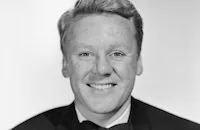
Van Johnson

Patricia Neal

Louis Calhern
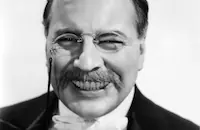
Sidney Blackmer

Philip Ober

Patricia Collinge

Moroni Olsen
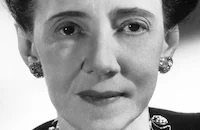
Elizabeth Patterson
Reinhold Schunzel
Fay Roope
Dan Riss
Joan Banks
Raymond Greenleaf
Gregory Marshall
Perry Sheehan
Jimmie Fox
Katharine Warren
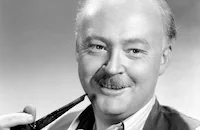
Don Beddoe
Wheaton Chambers

Emmett Vogan

Gregory Gay
Watson Downs

Marjorie Bennett

John Alvin
William Self
Carleton Young
Robert S. Ford
Madge Blake
Luther Crockett
Frank Sully
Wilson Wood
Frank Hyers
Maude Wallace
Emory Parnell

Bess Flowers
Sam Pierce
Hugh Beaumont
Thomas Brown Henry
Larry Dobkin
Harry Denny
Kenneth Gibson
Marshall Bradford
Gordon Richards
Dick Haynes
Nolan Leary

Willis Bouchey
David Bair
Tyler Mcvey
Selmar Jackson
Roy Butler
Harry Stanton
Creighton Hale

Larry Williams
A. Cameron Grant
Frank Cusack
Frank Pershing
Lulumae Bohrman
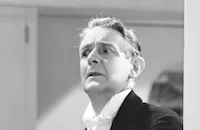
Leonard Carey
Philo Mccullough
Jessie Arnold
Lucy Lynn
Grace Hayle
Clarence Hennecke
Dick Winslow
Gay Gayle
Margie Liszt
Harry Nash
Harry Cheshire
Harry Cody
Alice Richey
Rhea Mitchell
Frank Jacquet
Helen Spring
Elizabeth Flourney
Crew
John Alton
Peter Ballbusch
Daniel B. Cathcart
Cecil B. Dickson
John Dunning
John Durant
Robert Franklin
Cedric Gibbons
A. Arnold Gillespie
Conrad Kahn
Lloyd Martin
Mike Masaoka
James W. Merrick
Warren Newcombe
Robert Pirosh
Helen Rose
Conrad Salinger
Dore Schary
Douglas Shearer
Al Shenberg
Alfred E. Spencer
Jerry Thorpe
Edwin B. Willis

Videos
Movie Clip



Film Details
Technical Specs

Articles
Washington Story
Dore Schary, one of the most liberal of all studio heads, personally produced this slight romantic comedy. He even got one of his proteges, Robert Pirosh, to write and direct it. Pirosh had won an Oscar® for writing Schary's first big MGM project, the 1949 World War II drama, Battleground. Schary had promoted him to directing two years later for Go for Broke!, the story of Japanese-Americans fighting in World War II.
To star, Schary and Pirosh picked Van Johnson, star of both Battleground and Go for Broke!. Schary had spotted the former chorus boy and convinced MGM to put him under contract in 1942. With the start of World War II, Johnson became one of the studio's top male stars, playing boy-next-door types. He brought the same charm to his role as the liberal, innocent senator.
Leading lady Patricia Neal had already demonstrated the right combination of romance and hard-edged cynicism in films such as The Fountainhead (1949) and the stage production of Lillian Hellman's Another Part of the Forest, which brought her Broadway's first Tony Award. The independent star never really fit in with the studio system, and Washington Story would be her last Hollywood film for years. She later moved to New York, making only occasional film appearances until she seemingly came out of nowhere to win the Oscar® for Best Actress in Hud in 1963.
Lending the slight romantic tale an air of authenticity was cinematographer John Alton's location shooting in Washington. Alton had first attracted notice with his low-keyed lighting of such classic films noirs as He Walked by Night and T-Men (both 1948). He seemed a strange choice for the glamorous MGM, but fit well with the studio's growing realism after signing on there in 1950. He had no problem doing lush, romantic work, however, and even won an Oscar® for his first color film, An American in Paris in 1951.
Director: Robert Pirosh
Producer: Dore Schary
Screenplay: Robert Pirosh
Cinematography: John Alton
Art Direction: Cedric Gibbons, Daniel B. Cathcart
Music: Conrad Salinger
Cast: Van Johnson (Joseph T. Gresham), Patricia Neal (Alice Kingsley), Louis Calhern (Charles W. Birch), Sidney Blackmer (Philip Emery), Philip Ober (Gilbert Nunnally), Patricia Collinge (Miss Galbreth), Elizabeth Patterson (Miss Dee).
BW-82m.
by Frank Miller

Washington Story
Quotes
Trivia
Notes
The film's working titles were Mr. Congressman and Mister Congressman. Although the film's main character, "Joseph Gresham," is supposed to be the representative from the 16th Congressional district in Massachusetts, at the time, Massachusetts had only 14 districts. The city of "Newchester" was also fictional. Various Hollywood Reporter news items, a New York Times feature article and M-G-M press releases reveal the following information about the production: In light of ongoing Congressional investigations of Communist activities in Hollywood, Dore Schary, M-G-M's vice-president in charge of production, wanted to produce a picture showing Congress in a positive light. Schary stated: "We're in an era of sensationalism, which has its virtues, but which also breeds cynicism...As an antidote, we want to examine the plus side of politics. We want to show the dirty punishment a good Congressman can take by `smear,' by pressure from lobbies, by misunderstanding his motives..." Actor Sam Jaffe was cast in the film, but because of Jaffe's alleged "connection with commie causes" he was removed from the production and paid off by M-G-M.
The film was shot on location in Washington, D.C. Interiors were shot throughout the Capitol Bldg., including the House chambers, the Capitol Rotunda and the Congressional subway that transports members to and from the House and Senate office building. The production had greater access to real Washington locations than any previous film. According to the Variety column "Inside Stuff-Pictures," while the picture was being filmed, the Washington Post ran an editorial criticizing the production crew for reportedly cleaning up the Capitol Rotunda prior to shooting because it was "much too dirty for the fastidious eyes of the movie customer." M-G-M's publicist for the film, James W. Merrick, wrote a letter to the editor after the piece ran, saying that the Rotunda had been thoroughly cleaned by the Capitol staff itself, prior to the company's arrival, and that cleaning done by the film crew was standard procedure for any film to bring out highlights and eliminate footprints. The Washington Post then stated that the original information had come from Merrick himself. Architect of the Capitol David Lynn was largely responsible for granting access for the film crew. Cecil B. Dickson, who appears briefly as a newspaper correspondent, had been a real Washington correspondent for many years.
Harry Nash, who had worked for forty-five years as a Capitol building guide, played a guide in the film. M-G-M had sought actress Nancy Olson from Paramount for the female lead in the film. Actress Marianne Ravenscourt was cast in the film, according to a Hollywood Reporter news item, but her appearance has not been confirmed. In August 1952, screenwriters Mildred Cram and Maurice Revnes sued M-G-M for $855,000, asserting that the studio had agreed to pay them $20,000 if it opted to use their story entitled "Mary Smith, U.S.A." Cram and Revnes claimed that their story was substantially the basis for Washington Story. The disposition of the suit has not been determined.














